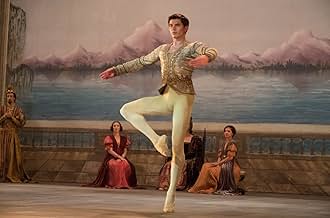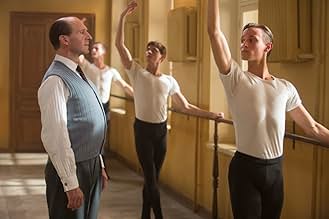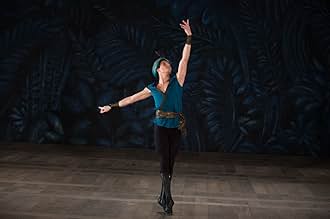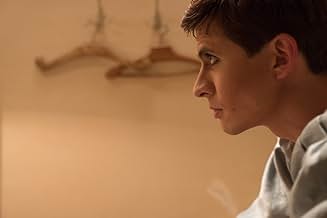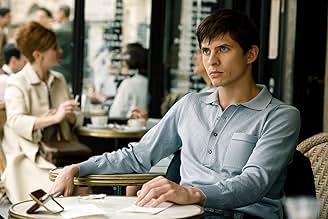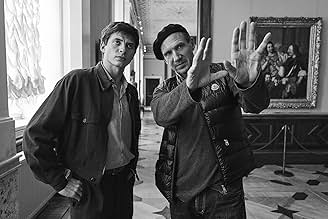IMDb RATING
6.6/10
7.3K
YOUR RATING
The story of Rudolf Nureyev's defection to the West.The story of Rudolf Nureyev's defection to the West.The story of Rudolf Nureyev's defection to the West.
- Awards
- 1 win & 4 nominations total
- Director
- Writers
- All cast & crew
- Production, box office & more at IMDbPro
Featured reviews
A biopic about Rudolf Nureyev: gifted with an exemplary technique, he is considered as the greatest classical dancer and as one of the greatest choreographers.
The actors Oleg Ivenko and Chulpan Khamatova are excellent whereas Ralph Fiennes is magnificent with a masterful interpretation of Alexander Pushkin, with restraint and sensitivity. He literally impressed me! Nevertheless, as a director, Ralph Fiennes is less convincing. He excessively insists on the haughty and unpleasant character of Rudolf Nureyev, to such a point that we almost want to slap him. In addition, the manifold alternations between the trip to Paris in 1961 (the present time) and the flashbacks (his childhood in a poor family and his debut as a dancer) are almost disturbing. I would have appreciated that Ralph Fiennes develops these different points: 1) An evocation of the trip to Vienna in 1959, formerly Western Europe, followed by a formal ban on all abroad travel formulated by the Russian Minister of Culture, which could have explained, without justifying, the oppressive and stifling behavior of the KGB members, in Paris in 1961. 2) A less dark presentation of the Soviet Union reduced to KGB members as obtuse as omnipotent. Indeed, at the beginning of the 60s, the Soviet aura was supreme: culture, science, geopolitical influence, ... For instance, the dramatic Nureyev's defection at the Paris Le Bourget Airport happened just two months after the Bay of Pigs invasion which was a significant failure for Kennedy's US foreign policy and a strong reinforcement of the relations between Cuba and the Soviet Union.
As a synthesis, the movie is excellently interpreted but the realization is slightly muddleheaded. 6/7 of 10.
The actors Oleg Ivenko and Chulpan Khamatova are excellent whereas Ralph Fiennes is magnificent with a masterful interpretation of Alexander Pushkin, with restraint and sensitivity. He literally impressed me! Nevertheless, as a director, Ralph Fiennes is less convincing. He excessively insists on the haughty and unpleasant character of Rudolf Nureyev, to such a point that we almost want to slap him. In addition, the manifold alternations between the trip to Paris in 1961 (the present time) and the flashbacks (his childhood in a poor family and his debut as a dancer) are almost disturbing. I would have appreciated that Ralph Fiennes develops these different points: 1) An evocation of the trip to Vienna in 1959, formerly Western Europe, followed by a formal ban on all abroad travel formulated by the Russian Minister of Culture, which could have explained, without justifying, the oppressive and stifling behavior of the KGB members, in Paris in 1961. 2) A less dark presentation of the Soviet Union reduced to KGB members as obtuse as omnipotent. Indeed, at the beginning of the 60s, the Soviet aura was supreme: culture, science, geopolitical influence, ... For instance, the dramatic Nureyev's defection at the Paris Le Bourget Airport happened just two months after the Bay of Pigs invasion which was a significant failure for Kennedy's US foreign policy and a strong reinforcement of the relations between Cuba and the Soviet Union.
As a synthesis, the movie is excellently interpreted but the realization is slightly muddleheaded. 6/7 of 10.
First-time actor Oleg Ivenko gives a strong performance here in the lead role of renowned ballet dancer Rudolf Nureyev. The biopic also has a most solid supporting cast and is directed by the fine actor Ralph Fiennes (who also has a supporting role in the film), and is written by the most talented David Hare, based on the book by Julie Kavanagh.
The biopic covers the early years of Nureyev from his most difficult early life in the Soviet Union, his incredible innate talent for ballet dancing, his complicated and flamboyant personality, love of the arts, and a most fervent desire for freedom.
I felt the heart of the movie was the tension filled final 20 minutes or so of Nureyev's defection to the West at a Paris airport, in 1961.He would be the first Soviet notable to do so during the Cold War.
All in all, although this biopic is deliberately paced and a little too long at over 2 hours in length I felt it was a solid effort all around. To note, Rudolph Nureyev would pass away in 1993 from AIDS, at the age of 54.
The biopic covers the early years of Nureyev from his most difficult early life in the Soviet Union, his incredible innate talent for ballet dancing, his complicated and flamboyant personality, love of the arts, and a most fervent desire for freedom.
I felt the heart of the movie was the tension filled final 20 minutes or so of Nureyev's defection to the West at a Paris airport, in 1961.He would be the first Soviet notable to do so during the Cold War.
All in all, although this biopic is deliberately paced and a little too long at over 2 hours in length I felt it was a solid effort all around. To note, Rudolph Nureyev would pass away in 1993 from AIDS, at the age of 54.
Greetings again from the darkness. Nijinsky. Nureyev. Bruhn. Baryshnikov. The legends of male ballet dancers starts with that list, and possibly include a handful of others. Ralph Fiennes directs a screenplay from David Hare that brings us the story of how one of these, Rudolph Nureyev, defected from Russia to the west in 1961.
Opening with Nureyev's teacher Alexander Pushkin being interrogated ("Why did he defect?") by a Russian official immediately after the defection, the film ping pongs between 3 time frames in an attempt to better explain Nureyev's reasons ... or at least the background that created such a headstrong and talented young man. We flashback to 1938 where his mother famously gave birth to him in the confines of a moving train (traveling and trains remained important to him). We then flash forward to 1961 when Nureyev arrives in Paris with the Kirov Ballet, and then back to 1955 as he arrives at the Vaganova Academy of Russian Ballet (established 1738) - a prestigious dance school.
It's actually this hopping from one time frame to another that is the film's weakness. The script is ambitious but ultimately flawed, as it attempts to tackle too much rather than concentrating on what's most important and interesting. We didn't need so many childhood flashbacks to grasp that Nureyev was a different kind of kid who grew up in poverty in Siberia, raised with his sisters by a mother whose husband was away at war. Julie Kavanagh's book "Rudolph Nureyev: The Life" inspired Mr. Hare's screenplay, but the multiple timelines can be more fully explored in book form.
Ralph Fiennes plays the aforementioned Pushkin, a soft-spoken man who was a father figure to Nureyev, as well as a technical instructor. He also shared his philosophy of dance (and his wife - maybe he knew, maybe he didn't) with his star pupil, and it's easy to see how this elevated Nureyev's ability. Combining that with his interest in classic art, a theme of turning ugliness into beauty was something Nureyev latched on to.
Oleg Ivenko stars as Rudolph Nureyev. Ivenko is a marvelous dancer and bears enough resemblance to the legend that we are quickly taken in. Ivenko is not a trained film actor, but as a dancer, he is accustomed to the spotlight and never wavers in his portrayal of a dancer he likely admired. He captures the emotional turmoil of a man enticed by the artistic and social freedoms of the west, while also remaining loyal to his homeland - loyal at least until he felt threatened (both physically and artistically). A tortured genius typically struggles with those in positions of authority and that's on full display here.
This is the third directorial outing for 2-time Oscar nominee (for acting) Ralph Fiennes. His previous projects were THE INVISIBLE WOMAN in 2013 which no one saw, and CORIOLANUS in 2011 which almost no one saw. It's likely his latest won't draw a huge audience either, but Ivenko's dancing is quite something to behold, and the climax at Le Bourget Airport in France is a suspenseful highlight. Nureyev was 23 at the time, and the defection decision is made almost spontaneously with a little help from his socialite friend Clara Saint (Adele Exarchapoulos, BLUE IS THE WARMEST COLOR) and French dancer Pierre Lacotte (Raphael Personnaz). Rudolph Nureyev died of complications from AIDS in 1993, but he truly was a "white crow" - something extraordinary, and one who stands out.
Opening with Nureyev's teacher Alexander Pushkin being interrogated ("Why did he defect?") by a Russian official immediately after the defection, the film ping pongs between 3 time frames in an attempt to better explain Nureyev's reasons ... or at least the background that created such a headstrong and talented young man. We flashback to 1938 where his mother famously gave birth to him in the confines of a moving train (traveling and trains remained important to him). We then flash forward to 1961 when Nureyev arrives in Paris with the Kirov Ballet, and then back to 1955 as he arrives at the Vaganova Academy of Russian Ballet (established 1738) - a prestigious dance school.
It's actually this hopping from one time frame to another that is the film's weakness. The script is ambitious but ultimately flawed, as it attempts to tackle too much rather than concentrating on what's most important and interesting. We didn't need so many childhood flashbacks to grasp that Nureyev was a different kind of kid who grew up in poverty in Siberia, raised with his sisters by a mother whose husband was away at war. Julie Kavanagh's book "Rudolph Nureyev: The Life" inspired Mr. Hare's screenplay, but the multiple timelines can be more fully explored in book form.
Ralph Fiennes plays the aforementioned Pushkin, a soft-spoken man who was a father figure to Nureyev, as well as a technical instructor. He also shared his philosophy of dance (and his wife - maybe he knew, maybe he didn't) with his star pupil, and it's easy to see how this elevated Nureyev's ability. Combining that with his interest in classic art, a theme of turning ugliness into beauty was something Nureyev latched on to.
Oleg Ivenko stars as Rudolph Nureyev. Ivenko is a marvelous dancer and bears enough resemblance to the legend that we are quickly taken in. Ivenko is not a trained film actor, but as a dancer, he is accustomed to the spotlight and never wavers in his portrayal of a dancer he likely admired. He captures the emotional turmoil of a man enticed by the artistic and social freedoms of the west, while also remaining loyal to his homeland - loyal at least until he felt threatened (both physically and artistically). A tortured genius typically struggles with those in positions of authority and that's on full display here.
This is the third directorial outing for 2-time Oscar nominee (for acting) Ralph Fiennes. His previous projects were THE INVISIBLE WOMAN in 2013 which no one saw, and CORIOLANUS in 2011 which almost no one saw. It's likely his latest won't draw a huge audience either, but Ivenko's dancing is quite something to behold, and the climax at Le Bourget Airport in France is a suspenseful highlight. Nureyev was 23 at the time, and the defection decision is made almost spontaneously with a little help from his socialite friend Clara Saint (Adele Exarchapoulos, BLUE IS THE WARMEST COLOR) and French dancer Pierre Lacotte (Raphael Personnaz). Rudolph Nureyev died of complications from AIDS in 1993, but he truly was a "white crow" - something extraordinary, and one who stands out.
Based on the life of Rudolf Nureyev (portrayed by Oleg Ivenko): in different time segments, the life of the ballet great is depicted during his childhood in rural Eastern Russia; his late teen years training in Leningrad (now St. Petersburg); and the Kirov Ballet tour in Paris of 1961 during which Nureyev made a decision that changed his life significantly. The film is based on the novel "Rudolf Nureyev: A Life" by Julie Kavanaugh and is a British/French/Serbian co-production spoken in Russian, French, and English.
One of the enjoyable aspects of the film is following the young man's transition from a rural area into cities as grand as Leningrad and Paris and his awestruck fascination with the visual arts at his disposal. This can easily remind many viewers of their first travel experiences and having felt the same elation.
The three different time sequences are done concurrently which is sometimes jarring and unnecessary. The film would probably have been better if done chronologically with only occasional flashbacks.
Around the halfway mark of the film, Nureyev is showing a lot of irritability in a restaurant scene. It is at this mark that the viewer could feel equally irritated after having had enough of the frequent timeline changes and the film's reduced energy by that point. Also in that scene, while Nureyev is showing a strong reaction to class prejudice from other Russians, there was little to indicate this problem in earlier scenes. His rudeness seems to come out of nowhere.
Despite these criticisms, it is all worth it for the extended climactic scene at Paris' Le Bourget Airport (very well re-constructed to resemble its appearance in the early 1960s). Much like the final airport scene in "Argo", the one here has suspense, tension, and mystery even if the outcome is already well known.
"The White Crow" is a fine tribute to an artistic icon and a good depiction of the life of a genius in a restrictive, Communist country although it would have benefited to explore more on another restriction in Rudolf's life under Communisim - his homosexuality. Considering the film concluded when its subject was still very young, it is tempting to encourage a sequel for the remainder of such a very unique life of an extremely rare individual who radically changed fate for his own life and that of the ballet world. - dbamateurcritic
One of the enjoyable aspects of the film is following the young man's transition from a rural area into cities as grand as Leningrad and Paris and his awestruck fascination with the visual arts at his disposal. This can easily remind many viewers of their first travel experiences and having felt the same elation.
The three different time sequences are done concurrently which is sometimes jarring and unnecessary. The film would probably have been better if done chronologically with only occasional flashbacks.
Around the halfway mark of the film, Nureyev is showing a lot of irritability in a restaurant scene. It is at this mark that the viewer could feel equally irritated after having had enough of the frequent timeline changes and the film's reduced energy by that point. Also in that scene, while Nureyev is showing a strong reaction to class prejudice from other Russians, there was little to indicate this problem in earlier scenes. His rudeness seems to come out of nowhere.
Despite these criticisms, it is all worth it for the extended climactic scene at Paris' Le Bourget Airport (very well re-constructed to resemble its appearance in the early 1960s). Much like the final airport scene in "Argo", the one here has suspense, tension, and mystery even if the outcome is already well known.
"The White Crow" is a fine tribute to an artistic icon and a good depiction of the life of a genius in a restrictive, Communist country although it would have benefited to explore more on another restriction in Rudolf's life under Communisim - his homosexuality. Considering the film concluded when its subject was still very young, it is tempting to encourage a sequel for the remainder of such a very unique life of an extremely rare individual who radically changed fate for his own life and that of the ballet world. - dbamateurcritic
A 'white crow' in the Russian idiom is someone who stands out from others because of their appearance or behaviour. Rudolph Nureyev was, and for many still is, the white crow in the world of male ballet dancers. With extraordinary athleticism and sharply chiselled features, he defied gravity and glamorised male dancing. He also managed to make the KGB look flatfooted when he famously defected to the West.
We first see the young Rudolph as a six-year old child prodigy plucked from a poor background. The film flashes-back to these early scenes several times to remind viewers that despite his majestic aura on stage, he came from humble origins. The adult Rudolph (Oleg Ivenko) was a volatile personality both on and off stage. KGB spies watched elite dancers closely because ballet was a major cultural propaganda tool at the height of the Cold War. Rudolph was known to praise creative freedoms in the West and his secret sexuality was seen as a potential source of political embarrassment.
Most of the film builds the context in which Rudolph would commit what Russians believed was the ultimate act of treason. Barely enough camera time is devoted to his ballet lessons and performances, but what is shown will please devotees of the artform. A major sub-narrative is the live-in mentoring by his teacher Pushkin (Ralph Fiennes) and his relationships with Pushkin's wife Xenia (Chulpan Khamatova) and socialite Clara Saint (Adele Exarchopoulos). Rather than meaningful affairs, these relationships show Rudolph's willingness to exploit anyone who could advance his dancing career.
The film's modest tension curve spikes a few times during Rudolph's fiery temper tantrums, but it jumps steeply during the climactic defection scenes. The camera almost neurotically switches from close-ups on the faces of Russian spies, American observers, Rudolph and Clara, all while in the transit area of a French airport. When Rudolph is stopped from boarding a flight to his next performance, the KGB falsely tell him he has been summoned to a gala performance for the Kremlin. He is thrust into a vortex of disbelief, terror, and the realisation that if he seeks political asylum he will never set foot again in his homeland nor see his family.
Despite its uneven pace and meandering narrative arc, this powerful non-fiction storytelling is backed up with excellent acting performances and cinematography. The Cold War tensions are palpable and the political battle lines drawn clearly. You do not need to be a ballet fan to appreciate this film.
Director: Ralph Fiennes Stars: Oleg Ivenko, Ralph Fiennes, Adele Exarchopoulos, Chulpan Khamatova
We first see the young Rudolph as a six-year old child prodigy plucked from a poor background. The film flashes-back to these early scenes several times to remind viewers that despite his majestic aura on stage, he came from humble origins. The adult Rudolph (Oleg Ivenko) was a volatile personality both on and off stage. KGB spies watched elite dancers closely because ballet was a major cultural propaganda tool at the height of the Cold War. Rudolph was known to praise creative freedoms in the West and his secret sexuality was seen as a potential source of political embarrassment.
Most of the film builds the context in which Rudolph would commit what Russians believed was the ultimate act of treason. Barely enough camera time is devoted to his ballet lessons and performances, but what is shown will please devotees of the artform. A major sub-narrative is the live-in mentoring by his teacher Pushkin (Ralph Fiennes) and his relationships with Pushkin's wife Xenia (Chulpan Khamatova) and socialite Clara Saint (Adele Exarchopoulos). Rather than meaningful affairs, these relationships show Rudolph's willingness to exploit anyone who could advance his dancing career.
The film's modest tension curve spikes a few times during Rudolph's fiery temper tantrums, but it jumps steeply during the climactic defection scenes. The camera almost neurotically switches from close-ups on the faces of Russian spies, American observers, Rudolph and Clara, all while in the transit area of a French airport. When Rudolph is stopped from boarding a flight to his next performance, the KGB falsely tell him he has been summoned to a gala performance for the Kremlin. He is thrust into a vortex of disbelief, terror, and the realisation that if he seeks political asylum he will never set foot again in his homeland nor see his family.
Despite its uneven pace and meandering narrative arc, this powerful non-fiction storytelling is backed up with excellent acting performances and cinematography. The Cold War tensions are palpable and the political battle lines drawn clearly. You do not need to be a ballet fan to appreciate this film.
Director: Ralph Fiennes Stars: Oleg Ivenko, Ralph Fiennes, Adele Exarchopoulos, Chulpan Khamatova
Did you know
- TriviaHayden Christensen, who trained extensively in ballet as a child, was first choice to star; however a persistent ankle injury prevented him from being able to perform to the standards demanded by Ralph Fiennes.
- GoofsIn a scene showing a close up of Nureyev's foot performing a tendu, the shoe he is wearing is a white split sole ballet slipper, a shoe that did not exist in the 1960s. Split sole ballet technique shoes have only been on the dance scene since the mid 1990s.
- Quotes
Claire Motte: You are with the company? Did you dance tonight?
Rudolf Nureyev: If I had danced, you would remember.
- ConnectionsFeatured in The White Crow: Ralph Fiennes and Oleg Ivenko in Conversation (2019)
- SoundtracksLa Bayadère 3rd Shade Variation
Composed by Ludwig Minkus
Arranged by Matthias Gohl
Performed by Ilan Eshkeri and The London Metropolitan Orchestra
Details
- Release date
- Countries of origin
- Official sites
- Languages
- Also known as
- Beyaz Karga
- Filming locations
- Production companies
- See more company credits at IMDbPro
Box office
- Gross US & Canada
- $1,828,784
- Opening weekend US & Canada
- $78,782
- Apr 28, 2019
- Gross worldwide
- $7,622,595
- Runtime
- 2h 7m(127 min)
- Color
- Aspect ratio
- 1.85 : 1
Contribute to this page
Suggest an edit or add missing content






